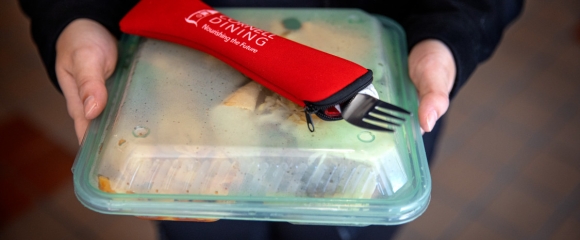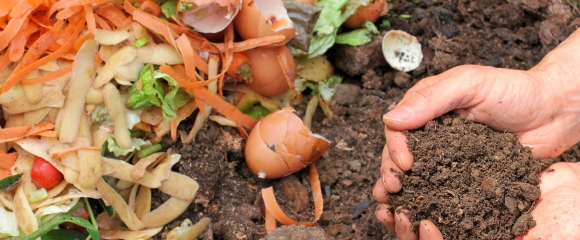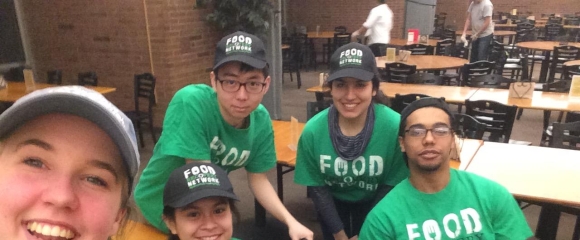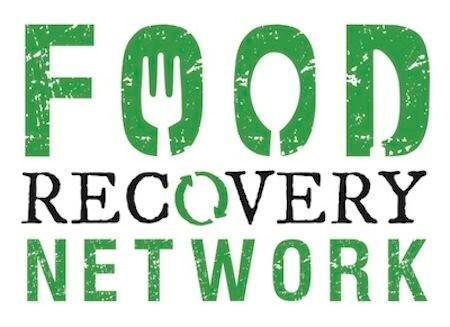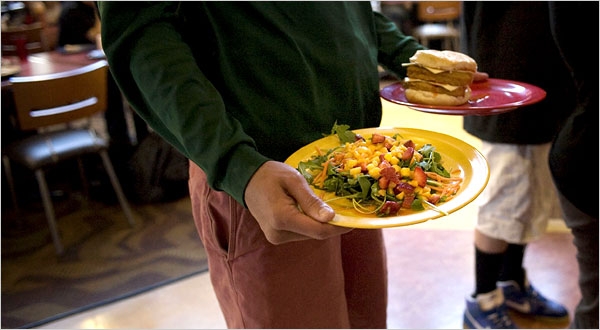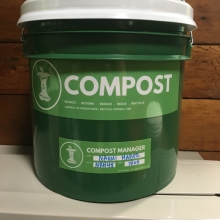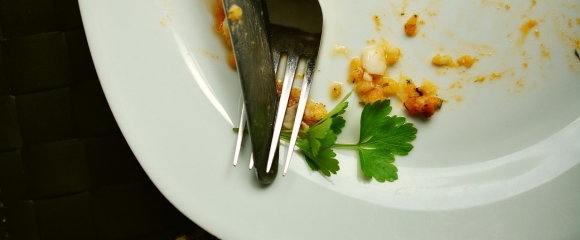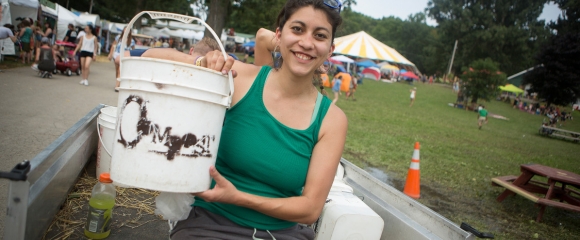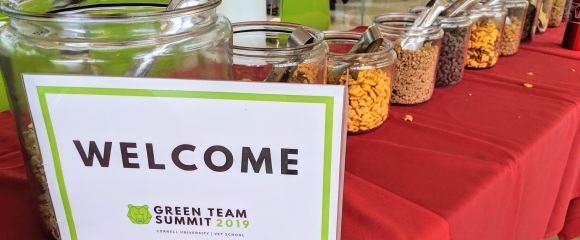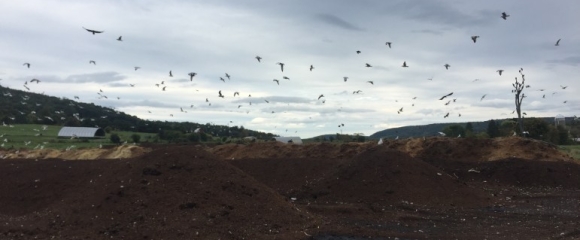Compost and Food Waste
Cornell is committed to reducing food waste through composting, educational programs, and in-house facilities that reclaim organic material and recover usable meals to reduce food waste. You can participate in food recovery and composting programs where you live and work.
Take Action:
• Become a Residential Compost Manager for your dorm on campus
• Book a compost crew to green your events
Our Food Waste History
- Cornell's Compost Facility, operated by Farm Services, first began operations in 1992, establishing food waste reduction as a priority on campus.
- We compost a wide range of materials from animal bedding at research facilities to greenhouse plant debris, collecting the waste in long windrows for decomposition.
- As early as 1998, Cornell Dining began composting food scraps as well and partnered with the Food Recovery Network in 2014 to redirect uneaten food to local pantries like the Friendship Donation Network in Ithaca.
Why does food waste matter?
According to a UN study, food loss and waste impacts are the world’s third-largest contributor to climate change, and the U.S. issues the highest amount of food waste per country with the EPA estimating that more food reaches landfills than any other material in our everyday trash. When we throw away edible food, we also exacerbate food hungry and insecurity for those in need and waste precious resources that have gone into the production, fertilization, and delivery of our food and organic material.
Two main strategies can help reduce food waste. Food recovery reduces the waste of edible food, by reducing waste during food preparation and cooking, and reclaiming usable food for those in need. Composting allows food scraps to become usable matter for improving farms, gardens, and for soil.
On-Campus Food Waste & Compost Initiatives
Cornell is committed to reducing food waste across the campus — from dining halls to dorm halls. As a leader in food waste reduction, Cornell takes on several sustainable programs.
Cornell Dining has been composting food scraps since 1998. Nowadays, all dining halls and retail dining eateries on campus compost food scraps.
Student compost managers ensure composting is available in all residential communities.
Cornell's Food Recovery Network chapter is a student-run organization which collects food from dining halls that would be thrown out and donates these leftovers to local pantries.
Dining Services
Composting bins are located in every dining hall on campus managed by Cornell Dining, and many other dining facilities on campus. All of Cornell Dining’s pre-consumer food waste is collected in every Dining unit and composted by one of the Cornell University Agricultural Experiment Station (CUAES) farms, Farm Services.
Did you know Cornell diverts 800 tons of food waste from the landfill by composting all kitchen scraps, uneaten food scraps, and paper napkins sent back to the kitchen on your plate? All of Cornell Dining's compost bins are located back-of-house. When eating in a dining hall, you should leave your food scraps and napkins on your plate and Cornell Dining staff will compost everything behind the scenes.
Both pre- and post-consumer food waste is diverted to Farm Services to be composted. Pre-consumer composting includes all food waste and plant-based products being composted during preparation and cooking before being served to customers, including all produce, dairy, meat trim loss, and any other food products that would not be eaten or salvaged.
Cornell Dining regularly donates produce and dairy products to the Food Bank of the Southern Tier which services 7 counties in the region. Cornell Dining also works with the Food Recovery Network to donate prepared, perishable food to Loaves and Fishes and other food banks in the Finger Lakes Region.
Cornell Food Recovery Network
Food Recovery Chapter at Cornell
The Cornell Chapter of the Food Recovery Network reduces dining food waste and tackles hunger by donating surplus meals from Cornell's dining halls to local food pantries. The FRN began recovering food from Becker House Dining Hall in 2014. Surplus meals from the dining hall are donated to the local Friendship Donation Network, where they are redistributed to pantries all over the county. Students and others are welcome to volunteer and help with food recovery efforts. Details are available on the FRN website.
"Compostable" serviceware: A misnomer
"Compostable" serviceware can't actually be composted. The materials don't always break down, and even with world-renowned researchers on the case, it wasn't working out. We had to break up with the "compostable" stuff. However, usable compost increased after banning serviceware, so rest easy knowing your wilting greens are on their way to a new life, not the landfill.
Trayless Dining
Trays cause consumers to take more food, which can lead to more food wasted. In addition to greatly reducing food waste, trayless dining saves water and energy and reduces the need for detergents that can be bad for the environment.
Cornell Dining began introducing trayless dining in 2008. A 2009 New York Times article cites Cornell as an early campus adopter of the practice.
Currently nine of the ten All You Care to Eat Dining Facilities practice trayless dining.
Cornell Dining has participated in living laboratory research to help inform better food waste-reduction practices. A 2015 study published in Public Health Nutrition using campus dining facilities found that trayless dining decreased the percentage of diners (average age 19.1 years) who took salad by 65.2%.
Residential Composting
As of 2018, composting is available in all on-campus residential communities.
Students can apply to become Residential Compost Managers, leaders on-campus overseeing kitchen compost bins within their residential communities and who provide peer-to-peer education on composting practices. Compost Managers empty compost bins weekly, work to reduce food waste contamination, and communicate with residential staff and the Campus Sustainability Office.
Off-Campus Food Waste & Compost Programs
You don't have to live on campus to get involved with compost initiatives, however. Ithaca residents have several options to compost their own food scraps and at local events to live more sustainably.
Cornell Compost, the student-run composting organization, can provide a trained compost team to handle and reduce food waste at local events.
Ithaca residents have several other off-campus compost options to make composting easier.
Check out the Green Events Guide for tips and tricks on how to manage your events for maximum food recovery on campus.
Cornell manages all of its compost at an experimental agriculture facility operated by Farm Services.
Farm Services Composting Facility
We manage our own compost at Cornell. The University’s compost facility is operated by CUAES Farm Services. Farm Services handles over 60 waste streams across campus and composts about 3,400 tons of waste annually.
Cornell’s compost facility, operated by Farm Services, turns 4,000 tons or 8 million pounds of organic waste annually into high-quality compost. Instead of trucking the waste to a landfill, it is composted at a location just one mile from campus.
The organic waste collected from over 60 Cornell waste streams is piled in long heaps, called Windrows–– each about the length of a football field. Windrows are turned almost weekly from April through November. The consistent aeration and mixing of the organic materials speed the composting process and help to regulate moisture levels. Microbes feed on the decomposing waste, which heats the piles internally to 120-160°F during the process. These high temperatures aid in the destruction of pathogenic organisms and weed seeds. It takes about nine months to turn organic waste into mature compost.
From Waste To Compost
Farm Services collects and weighs campus compostables each weekday, and transports these materials to the four-acre composting facility. The compost facility began operations in 1992, and was designed with help from the Department of Biological and Environmental Engineering.
The collected materials, generated annually by over 60 Cornell waste streams, include:
- 2,700 tons of animal bedding and manure from research and teaching facilities
- 300 tons of plant debris from campus greenhouses, orchards, and farms
- 800 tons of food scraps and organic kitchen waste from Cornell dining halls and small eateries
- Other waste streams, such as building-specific compost collection programs and special events
The waste is piled in sequential long heaps, called windrows. Each windrow is about seven feet tall and the length of a football field. The windrows are turned weekly from April through November. The consistent aeration and mixing of the organic materials speed the composting process and help to regulate moisture levels. Microbes feed on the decomposing waste, which heats the piles internally to 120-160⁰F during the process. These high temperatures aid in the destruction of pathogenic organisms and undesirable weed seeds.
Any water and nutrient runoff from the compost facility is captured in two large collection ponds and is either returned to windrows when they are too dry or pumped to pastureland that serves as a bio-filter to uptake water and nutrients.
It takes about six to nine months to turn organic waste into mature compost. Much of the compost is used by Cornell’s nearby agricultural operations and on campus with landscape projects. A small amount is also sold to the public or donated to local charitable organizations.
Compost FAQs
Where does the compostable waste come from?
- 2,700 tons of animal bedding and manure from research and teaching facilities
- 800 tons of food scraps and organic kitchen waste from Cornell dining halls and small eateries
- 300 tons of plant debris from campus greenhouses, orchards, and farms
- Other waste streams, such as building-specific compost collection programs and special events
Why do you have to turn the compost?
- Turning provides oxygen for the microbe population and keeps them active, happy, and hungry for more organic waste. Mixing the organic materials by turning them weekly, assures a uniform finished compost.
Does it smell?
- As long as the compost has enough airflow so that the process remains aerobic, it might have some earthy odor, but should not smell bad. Finished compost smells similar to the rich soil in the forest.
What about the green/brown balance?
- Generally speaking, green organic material (e.g. plant clippings, kitchen scraps) provides nitrogen, and brown material provides carbon (e.g. wood chips, straw). The microbes in the compost pile need both to do their work. To keep a balanced carbon-to-nitrogen ratio, a compost pile needs the right mixture of different compostables.
Can you compost in winter?
- We keep collecting organic waste throughout the winter. The microbes are less active in colder temperatures, but the composting process is still happening. The temperature in the center of an active compost pile is much greater than the ambient temperature, commonly above 120°F.
Will composting break down trace pesticide residues?
- Yes. Microbial action, heat generated during the composting process, and time for compounds to decay, are all factors that help pesticide residues to degrade and break down into harmless chemicals during the composting process.
When is the compost ‘done?’
- After about 9 months the compost will no longer heat up, even after mixing. It has become dark, loose, and crumbly, similar to the humus of a forest floor, and is ready to be used.
Where does the mature compost go?
- Most of the compost is used by Cornell’s nearby farms, gardens, and greenhouses, and for landscape projects on campus. A small amount is sold to the public or donated to local charitable organizations.

